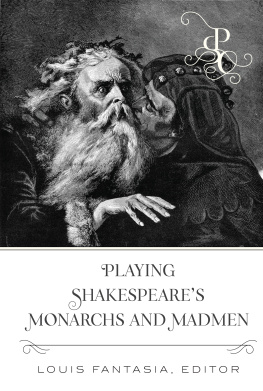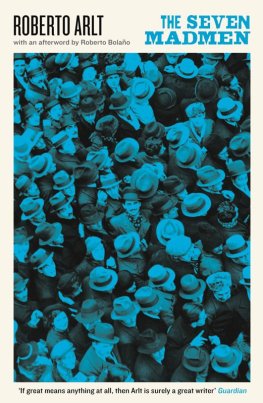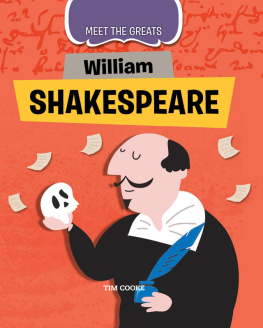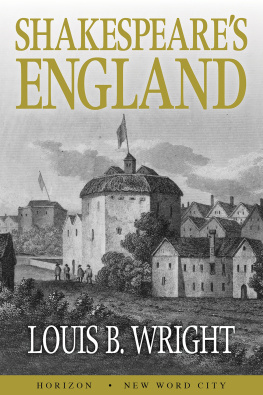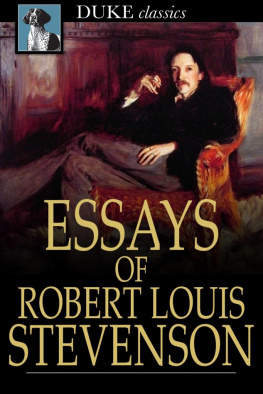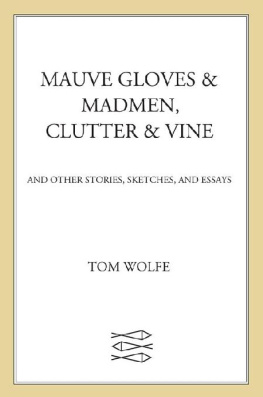Louis Fantasia - Playing Shakespeare’s Monarchs and Madmen
Here you can read online Louis Fantasia - Playing Shakespeare’s Monarchs and Madmen full text of the book (entire story) in english for free. Download pdf and epub, get meaning, cover and reviews about this ebook. year: 2020, publisher: Peter Lang Copyright AG, genre: Children. Description of the work, (preface) as well as reviews are available. Best literature library LitArk.com created for fans of good reading and offers a wide selection of genres:
Romance novel
Science fiction
Adventure
Detective
Science
History
Home and family
Prose
Art
Politics
Computer
Non-fiction
Religion
Business
Children
Humor
Choose a favorite category and find really read worthwhile books. Enjoy immersion in the world of imagination, feel the emotions of the characters or learn something new for yourself, make an fascinating discovery.
- Book:Playing Shakespeare’s Monarchs and Madmen
- Author:
- Publisher:Peter Lang Copyright AG
- Genre:
- Year:2020
- Rating:5 / 5
- Favourites:Add to favourites
- Your mark:
- 100
- 1
- 2
- 3
- 4
- 5
Playing Shakespeare’s Monarchs and Madmen: summary, description and annotation
We offer to read an annotation, description, summary or preface (depends on what the author of the book "Playing Shakespeare’s Monarchs and Madmen" wrote himself). If you haven't found the necessary information about the book — write in the comments, we will try to find it.
Playing Shakespeare’s Monarchs and Madmen — read online for free the complete book (whole text) full work
Below is the text of the book, divided by pages. System saving the place of the last page read, allows you to conveniently read the book "Playing Shakespeare’s Monarchs and Madmen" online for free, without having to search again every time where you left off. Put a bookmark, and you can go to the page where you finished reading at any time.
Font size:
Interval:
Bookmark:


Playing Shakespeares Characters series is part of the Humanities list.
Every volume is peer reviewed and meets the highest
quality standards for content and production.

Playing Shakespeares
Monarchs and Madmen
Louis Fantasia, Editor

Library of Congress Cataloging-in-Publication Data
Names: Fantasia, Louis, editor.
Title: Playing Shakespeares monarchs and madmen / edited by Louis Fantasia.
Description: New York: Peter Lang, 2020.
Series: Playing Shakespeares characters; vol. 3
ISSN 2575-9191 (print) | ISSN 2575-9205 (online)
Includes bibliographical references and index.
Identifiers: LCCN 2020000213 (print) | LCCN 2020000214 (ebook)
ISBN 978-1-4331-7522-0 (hardback: alk. paper) |
ISBN 978-1-4331-7523-7 (ebook pdf)
ISBN 978-1-4331-7524-4 (epub) | ISBN 978-1-4331-7525-1 (mobi)
Subjects: LCSH: Shakespeare, William, 15641616CharactersKings and
rulers. | Shakespeare, William, 15641616CharactersMentally ill. |
Shakespeare, William, 15641616Criticism and interpretation. |
Monarchy in literature. | Mental illness in literature. | Characters and
characteristics in literature. | English dramaEarly modern and
Elizabethan, 15001600History and criticism.
Classification: LCC PR2992.K5 P57 2020 (print) | LCC PR2992.K5 (ebook) |
DDC 822.3/3dc23
LC record available at https://lccn.loc.gov/2020000213
DOI 10.3726/b17173
Bibliographic information published by Die Deutsche Nationalbibliothek.
Die Deutsche Nationalbibliothek lists this publication in the Deutsche
Nationalbibliografie; detailed bibliographic data are available
on the Internet at http://dnb.d-nb.de/.
2020 Peter Lang Publishing, Inc., New York
29 Broadway, 18th floor, New York, NY 10006
www.peterlang.com
All rights reserved.
Reprint or reproduction, even partially, in all forms such as microfilm,
xerography, microfiche, microcard, and offset strictly prohibited.
Louis Fantasia , B.A., M.F.A., is the director of the Los Angeles Shakespeare Institute, a joint project of the Shakespeare Center of Los Angeles and the UCLA/William Andrews Clark Memorial Library. His books include Instant Shakespeare, Tragedy in the Age of Oprah: Essays on Five Great Plays, and Talking Shakespeare.
Playing Shakespeares Monarchs and Madmen is the third volume in the Peter Lang series, Playing Shakespeares Characters. As in the previous volumes, a broad range of contributors (actors, directors, scholars, educators, etc.) analyze the concepts of monarchy, leadership, melancholy and madness with not only references to Elizabethan and Jacobean studies, but also to Trump, Brexit, cross-gender and multi-cultural casting. What does it mean to play the king in the 21st century? What is the role of an all-licensed Fool in the age of spin? Who gets to represent the power dynamics in Shakespeares plays? This volume looks at the Henrys, Richards, Hamlets, Lears and various other dukes and monarchs and explores the ways in which menand womenapproach these portrayals of power and the lessons they hold for us today.
This edition of the eBook can be cited. To enable this we have marked the start and end of a page. In cases where a word straddles a page break, the marker is placed inside the word at exactly the same position as in the physical book. This means that occasionally a word might be bifurcated by this marker.

For Mrs. Fantasia
Suit the action to the word, the word to the action, with this special observance: that you oerstep not the modesty of nature. For anything so oerdone is from the purpose of playing, whose end, both at the first and now, was and is to hold, as twere, the mirror up to nature
( Hamlet , Act 3, scene 2)

Louis Fantasia
Heather James
Chris Anthony
Janna Segal
Terri Power
Elaine Turner
Michael Peter Bolus
Jessie Lee Mills
Timothy Harris
Louis Fantasia

Louis Fantasia
Americans have mixed feelings about monarchs and monarchies. We revolted against one, yet, in our periodic yearnings for the trappings of the occasional imperial presidency we sometimes wish we had a king. We embrace, unknowingly perhaps, the medieval concept of the kings two bodies, often equating the health and stability of the man (almost always men in Shakespeare) who rules, with the body politic of the country itself, whether it is the Life magazine-style glamour of Kennedys Camelot or the Twitter-fed tribalism of Trumps American carnage.
Americans, speaking again very broadly, tend to view Shakespeares histories through the first of these two bodies. We look to the plays for a study of the man, not the monarchy: Hals growing up, Hamlets angst, Richard IIIs seductive villainy, Lears madness, etc. Then we pause and look kindly, if not condescendingly, on the political bits, cutting them where we can (maybe the Brits get this stuff, I dont) or trying to make them relevant (setting the Henriads in the American Civil War, for example). All of which tends to imbue the plays with an over-coating of rugged American individualism that I am not sure Shakespeare had in mind (as if one could ever know).
One of the ways recent productions have tried to counter this, as several of our contributors point out, is to have women play the kings (not that women cant be rugged individualists, let me hasten to add). It seems from the essays in this volume, as well as other recent commentaries, that the casting of women, and particularly women of color, has a democratizing effect on these plays; that their kingships seem more collaborative and their relationships less self-aggrandizing than when performed by men. But is that what Shakespeare intended (again, as if one could ever know)? Or does it simply frame the individualism through an alternative lens? A refreshing and 1 | 2 needed lens, but an individualistic lens nonetheless. Is there yet another lens through which we can read the plays as more about the public body politic, than the private one?
Jan Kott, in his seminal study The Kings, wrote of history as a Grand Mechanism, a staircase or a great wheel, on which a Henry or Richard is always rising or climbing to the top while another of the same name is tumbling down. History is a ruthless machine, implacable and impersonal. There was no Lords anointed in Shakespeares view of history, Kott argued, only a lust for power that drove monarchs to chop off heads, build or break alliances, and busy giddy minds / With foreign quarrels ( HIV2 , 4.1.37230). But when Henry V reads out the list of English dead after the battle of Agincourt, those mentioned are nobility, like himself, the one per-center band of brothers. Of those of no name but five and twenty who died ( HV , 4.8.110), both Hal and Kott seem to have forgotten the likes of Mouldy, Shadow, Wart, Feeble, Fang, Bullcalf, Snare and Davy, who Shakespeare and Falstaff use for cannon fodder in Henry IV, Part 2 . To the one percent they are indeed of no name.
Font size:
Interval:
Bookmark:
Similar books «Playing Shakespeare’s Monarchs and Madmen»
Look at similar books to Playing Shakespeare’s Monarchs and Madmen. We have selected literature similar in name and meaning in the hope of providing readers with more options to find new, interesting, not yet read works.
Discussion, reviews of the book Playing Shakespeare’s Monarchs and Madmen and just readers' own opinions. Leave your comments, write what you think about the work, its meaning or the main characters. Specify what exactly you liked and what you didn't like, and why you think so.

